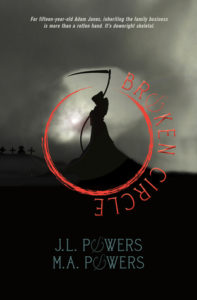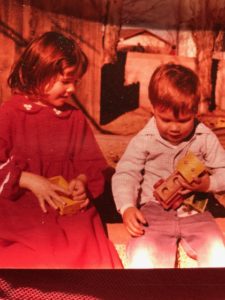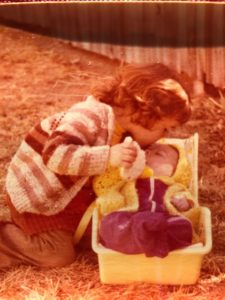 Welcome to J.L. and M.A. Powers, the co-authors of Broken Circle, out last month from Akashic BooksI They’re here to talk about the themes of the novel, their experience of writing a book together, and why they chose to work with a small press rather than a large corporate publisher.
Welcome to J.L. and M.A. Powers, the co-authors of Broken Circle, out last month from Akashic BooksI They’re here to talk about the themes of the novel, their experience of writing a book together, and why they chose to work with a small press rather than a large corporate publisher.
Description, from Goodreads: Adam wants nothing more than to be a “normal” teen, but his reality is quickly leaking normal. Afraid to sleep because of the monster that stalks his dreams, Adam’s breakdown at school in front of his crush Sarah lands him in the hospital.
As he struggles to cope with his day-to-day life, Adam can only vaguely comprehend some sort of future. His mother died when he was only four and his eccentric father – who might be an assassin, a voodoo god, the reincarnation of the Buddha, or something even stranger – is never available when Adam really needs him. Even his paranoid grandfather, who insists that people are “out to kill the entire family,” is no help.
Adam’s life takes an even weirder turn when a fat man with a gold tooth and a medallion confronts his father regarding Adam’s supposed “True Destiny.” Adam is soon headed toward a collision with life, death, and the entities charged with shepherding souls of the newly dead, all competing to control lucrative territories where some nightmares are real and psychopomps of ancient legends walk the streets of North America.
Kirkus has called Broken Circle, “a gripping, philosophical paranormal thriller.”
 What inspired you to write Broken Circle? Was it initially your idea, or your brother’s?
What inspired you to write Broken Circle? Was it initially your idea, or your brother’s?
J.L. The idea for Broken Circle was initially my brother’s. In fact, there is probably no way this idea would ever have occurred to me! I have never before written fantasy and I probably wouldn’t dare do it without him. Having said that, once he came up with the idea, I was very interested in exploring how we think about or refuse to think about death in our society, and I liked these characters that came along as we wrote it, so I wanted to keep going.
M.A.: The inspiration came from a short story idea, about a girl dating a boy and texting her girlfriend about how he wouldn’t introduce her to his family, and he always wanted to go to the beach, and didn’t want to talk about anything sad–and the reader knows that his father is the Grim Reaper and his rebellion is to be as sunny, as flippant, as un-grave (pun intended) and un-death-like as possible. I thought that was funny. Then it morphed into something as equally as funny but about a boy who is deathly afraid of death and doesn’t realize that he is going to have to deal with death for the rest of his life–as a job. I guess I have a macabre sense of humor. I think it’s funny to have situations that seem semi-ironic that the reader knows about but the character is completely oblivious to and you wonder if they’re going to figure it out or not–especially the more ridiculous it is, the funnier. “The Emperor Has No Clothes” is funny because the community is keeping a secret from the king, but the king is also in on it because he doesn’t want to seem like an idiot that he can’t see the clothes–it isn’t told as a funny story anymore but it is hilarious. There’s a fine line between humor and cruelty sometimes. If a character can see the ridiculousness of their story at the same time as seeing the seriousness of it–“I’m supposed to help dead people?”–can make the character and the story very appealing. Life is either a tragedy or a comedy–and the same things happen in both stories–it just depends on how you look at it.
Often co-authored books involve each author writing alternating chapters from different characters’ points of view. Yours, however, only has Adam’s point of view, interspersed with short third person chapters that take place sometime in the past. What was your co-authorship process like? Did you have any division of labor?
M.A. It was super-duper! There wasn’t really a huge division of labor. We just both went over everything. Except for the hard-core editing–I can’t spell or proofread. That was all Jessica.
J.L. Maybe it took awhile to get into the groove of how we would work. I’d only ever seen the alternating chapters style before. We wrote about 50,000-60,000 words of another novel that we never finished (maybe we will someday?) and that probably set the groundwork for how we would function in this relationship.
Your publisher is Black Sheep Press, the YA imprint of Akashic Press. How did you end up with Akashic? Did you always know you’d publish this book with a small press? How is working with a small press different from a Big 5 or other major player in YA books?
J.L. We ended up with Black Sheep/Akashic because they are the only people I submitted this manuscript to. I have worked closely with Akashic on a couple of past projects, and in my work for Cinco Puntos Press, we are colleagues who often share a booth at library and book conferences. I felt like this book fit really well into their mission and it was a book I really wanted to see at an independent press and succeed there. I love independent publishers so much. I’m not biased at all ha ha. (I started my own publishing company this year….Now I’m an independent publisher too.)
I enjoyed working with my editor at Knopf but I certainly felt like I got a little lost when it came to pre-publication and post-publication marketing. There was a lot I was willing to do for my book on my own dime but there was no discussion of it, and not a strong openness when I approached it. I remember when I said I’d be wiling to do pay my own way to BEA, they responded, “Well, if you do that, come by the booth and say hi.” That suggested to me that it would be pointless to go to BEA; they weren’t planning any kind of big promotion for my book there, and they wouldn’t do something even small-scale if I came. I was a little, little fish in that big sea, and a little fish they didn’t want to help become bigger. And there’s nothing wrong with being a little little fish in a big sea, but in the end, I felt like the closeness I gained to both my editors and marketing teams (or usually marketing person) when I started publishing with independent presses can’t be replaced.
Also, and I’ve started stating this much more openly: Independent publishers absolutely deserve our respect, gratitude, and support–financially and vocally and with our careers. My second book was set in Africa and frankly, the big publishing houses were afraid of it. They said they loved the book but “didn’t know how to market it.” They didn’t state this but basically they were saying, “White people read books about white people and black people read books about black people and we don’t know how to market a book about a young black woman because we don’t know how to market to black people.” This is insane. It’s an insane belief to begin with–come on, people, are we really so isolated in our identities?–but also an insane way to approach marketing or publishing anything! Things are changing, thankfully, and I’m very very glad. But the majority of diverse books are still being published by independent presses, and books that challenge the status quo Eurocentric understanding of what is aesthetically pleasing are certainly being published by independent presses, and those are initiatives that I want to support, full stop. I’ll support it when I see it from big publishers, too, and I’m always grateful when I do. But because most of it comes from independent presses, that’s where I’m spending the majority of my time: my money when I buy books, my reviews when I review books, the aisles I wander down when I’m at trade shows, and for the most part, my manuscripts when I send them out. Never say never but I really, really love independent publishers and I’m beyond glad to count myself in their company!
 While your novel is a contemporary fantasy, it has much to say to readers in the present day. What would you like teen readers to take away from reading Broken Circle?
While your novel is a contemporary fantasy, it has much to say to readers in the present day. What would you like teen readers to take away from reading Broken Circle?
M.A. There are multiple cultural views of death, but it’s an inevitable ending for all of us. Refusing to accept it is probably unhealthy to our psyche. Coming to terms with your mortality may help to make your life richer because you don’t have as much fear of how or when it ends. And the funny thing is, I certainly haven’t come to terms with death! I can only imagine that it would be a nice thing once you’ve done it…..
J.L. We have these cultural markers for what makes a successful life, and people tend to feel like they’ve failed if they don’t meet any of those during their lifetime–example, falling in love with the “right person.” Without dismissing the human need to love and be loved, why do we choose these kinds of markers for what makes a “successful” life? I think some people tend to panic as they age because they feel, in some way, that they haven’t reached these standards of success. Maybe we need to change the standards of what makes a successful life. Maybe we need to start working those things out earlier, for ourselves, creating our own personal standards so that we can actually succeed and be happy with our lives–rather than trying to live by what society deems successful.
Without giving away any spoilers, do you have any future plans for Adam, his family, and his friends?
M.A. Yes!!!!
J.L. LOL. We are working on Book 2 and there are some real surprises in there. It’s hard to say anything about it at all, except it more or less picks up where Book 1 left off. At least, at the moment. Things change on a daily basis….